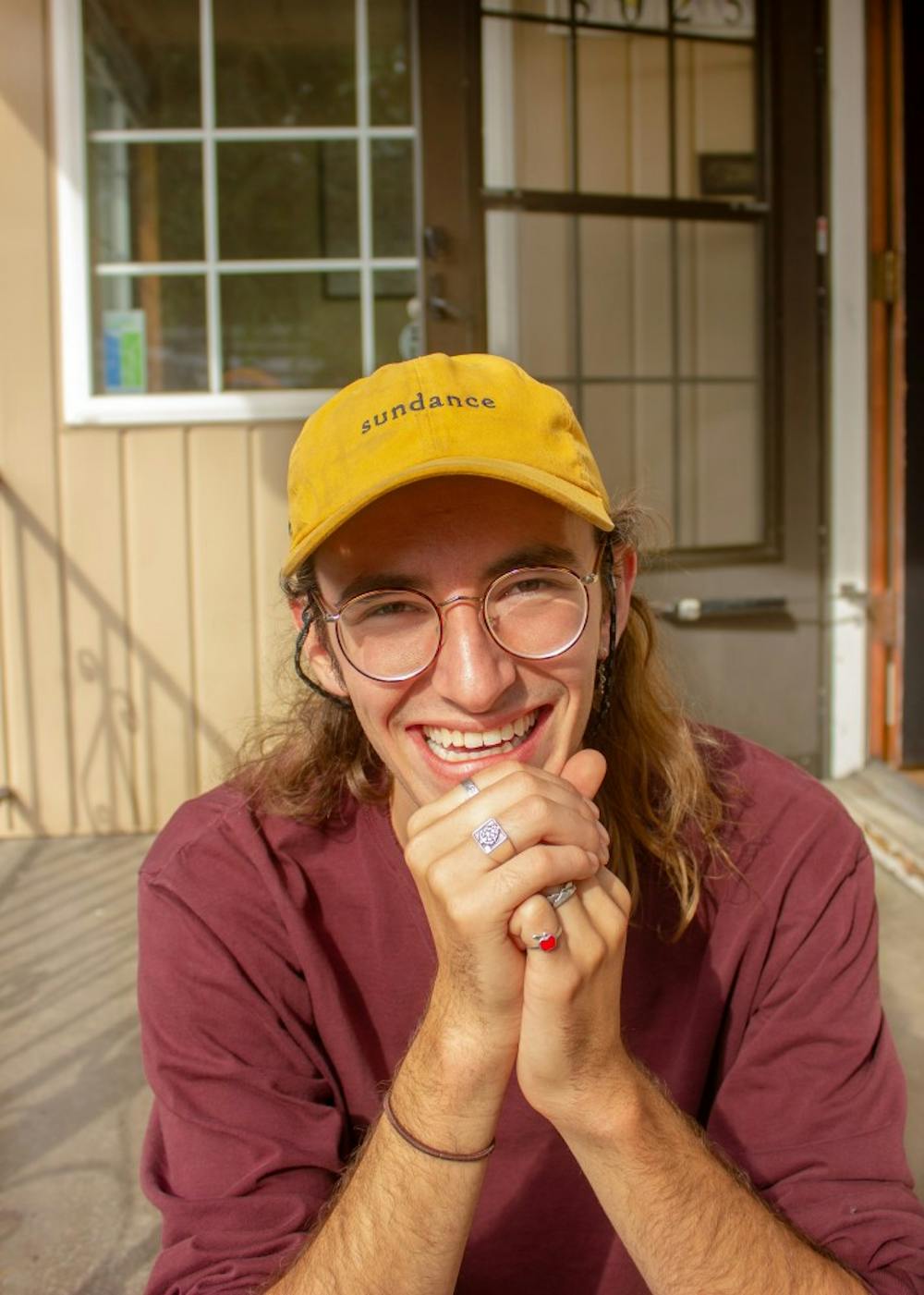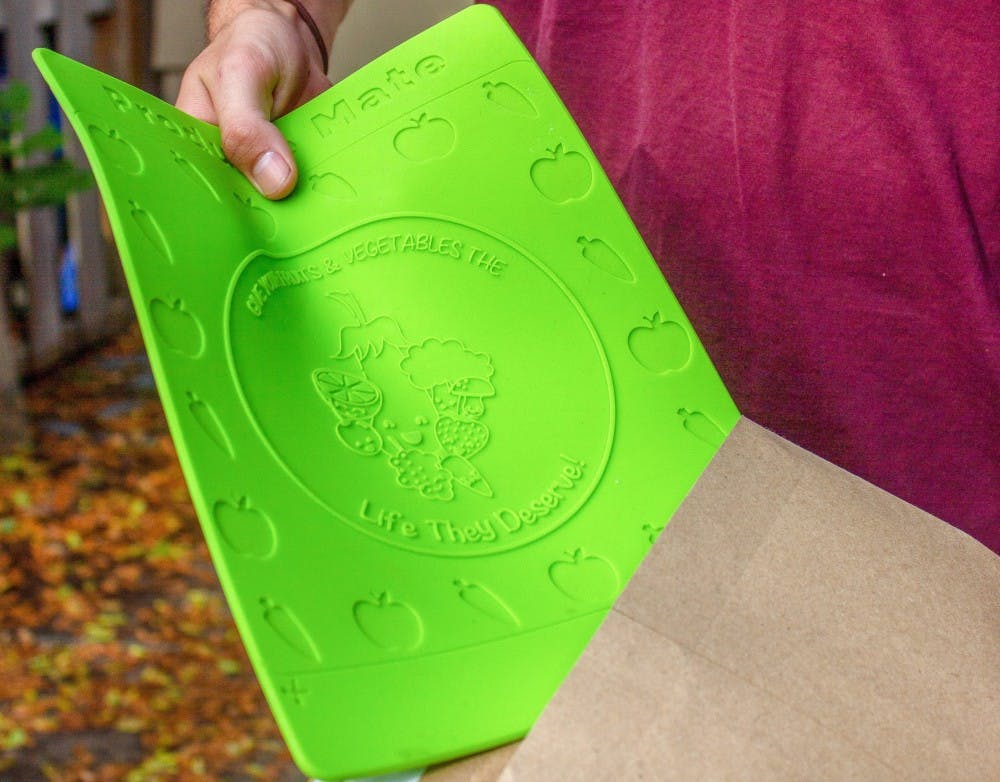Take a deep breath and try not to look too sweaty. Stay calm even though hundreds of eyes are staring at you. Speak loudly because you don’t have a microphone and make sure they hear you. Breathe.
These were the thoughts running through Dagan Kay’s head before he delivered a five-minute pitch about his product, Produce Mate. He spoke in front of 384 people at Invent Oregon, a one-day competition for inventors and entrepreneurs from Oregon colleges and universities in Klammath Falls, Oregon.
A few hours after his high-stakes speech, Kay found out he was the winner of the competition and took home $12,500. He plans to use the money to try to be an entrepreneur.
Even a couple months after the big win, Kay said he is “still floored, and it’s just crazy.”
Kay is busy preparing for the launch of his product, which is planned for the end of this year on his website.
Produce Mate has been over a year in the making. Kay, a senior philosophy major, spent his junior year in UP’s Entrepreneur Scholars program creating the product he said he thinks will change the way people consume produce.
Produce Mate is a silicon mat with added minerals that is approximately the size of a piece of paper. Kay designed the product and found manufacturers to produce it in China. Then, he sent his product off to a third-party testing company in Idaho to see if it really worked. The testing found that the mat extends the life of fruits and vegetables by 40 percent because of the use of negative ions.
“We’re eliminating the pain of you know ‘one of my tomatoes went bad, I bought four of them and now I have to throw one away,’ because that's 25 percent of your money in the trash,” Kay said. “Produce Mate will put a stop to that. That’s the idea.”

“Chilling with a big check”
During Invent Oregon, Kay competed against 20 other finalists, who each had five minutes to give their pitch for their product to the crowd. Most of Kay’s competitors stood at the back of the stage with a microphone that he said sounded terrible.
Because the microphone sounded awful, Kay said he gave his speech without it and was awarded best pitch.
“I was pretty happy to receive that,” he said.
Only moments later, he found out he won overall bringing his total earnings that day to $12,500.
“I was sitting down chilling with a big check ($2,500 for Best Pitch),” Kay said. “And then they were announcing the winner and I wasn’t ready at all. I was pretty surprised to be honest.”
Kay said his competitors were dedicated to solving serious problems. They pursued projects like tracking dwindling bee populations, building rockets, developing methods to create green energy and ways to be more sustainable.
“To be selected among those people as the winner was humbling, and I’m pretty happy about it,” Kay said. “I feel mostly grateful to have been around those people, and in the circle of people involved in that because yeah it was crazy. These are like some of the highest performing people, I think, in the entire state in this space.”
It all started with a mood bracelet
For Kay to have all the success in competitions, he said he had to put in long hours to create a product that not only worked, but that he could pitch well.
He was able to practice pitching and selling his product through UP’s E-Scholars program, which is a year-long program students spend thinking of new product and service ideas, and proving if they were feasible or not.
Students in the program take nine credits over two semesters co-taught by Peter Rachor, director for entrepreneurship, and Robin Anderson, Franz chair in entrepreneurship and Pamplin School of Business dean.
“E-Scholars is a program that is basically like a start-up incubator right here on campus,” Kay said.
Even though there is an academic aspect, the real work starts outside of the classroom. Each student has to create a business and “make ideas happen,” Rachor said.
Most E-Scholars spend the majority of the first semester deciding on an idea to go forward with. But Kay didn’t. He started his junior year with a curiosity that morphed into his idea for a product.
Rachor said Kay got his inspiration from mood bracelets. He and his dad had realized that they might be able to help vegetables and fruit last longer because of the use of negative ions within the bracelet.
Kay says he and his Dad found negative ions are shown to interfere with bacteria growth.
After months of doing research on manufacturers, making design tweaks and formulating a business model, Kay participated in his first competition at UP’s 100k Venture Challenge associated with Invent Oregon and received second place in two categories: For-Profit Venture and Invention.
Kay said that UP’s 100K Challenge “opened the door to Invent Oregon.”

Luckily for Kay, he does not have to do it all alone. He brought two equal partners into the company. His dad, David Kay, and his family friend, John Underwood. Despite having partners, Kay said he runs all of the day-to-day operations, like marketing and research, while Underwood and his dad are solely responsible for the financial side and advising Kay when needed.
Kay attributes a lot of his success to the support he got within his E-Scholars cohort. Even though they did little competitions within the class, the students and Rachor were great resources for one another.
Molly Launceford was also a E-Scholars, and a huge supporter of Kay. They said Kay motivated the rest of the class because he had a clear vision of where to take his project.
“It was always like where are we supposed to be as a class and then where are we supposed to be in relation to Dagan,” Launceford said. “He’s always like five steps ahead of everyone.”
Reflecting on the past and looking to the future
For Kay, the interest in entrepreneurship is because he doesn’t want to work for other people in the future. He said he realized this back in high school because of his past job experiences.
Like many high-schoolers, Kay did not work a “normal” job. He did whatever he could to earn some cash. He started his own digital marketing business as a junior and tutored as a senior. Kay enjoyed his time doing digital marketing, but hated tutoring. But he said it took him awhile to realize that owning a business was a feasible career path.
Now, Kay created this product he has control over, and can be his own boss.

By the end of the year, the product will be launched and on his website for sale. From then on, he will spend substantial hours working for the company, including handling the sales and figuring out what tweaks to make. The initial launch will let him test the market and see what’s working and what he needs to change on the next run.
“I’d be amissed to say that I wasn’t nervous about it, but it has a lot of potential,” David Kay said. “Something that we could sell millions and tens of millions of pieces over the next three, four or five years.”
And even though senior year can stress out many students, Kay said he isn’t worried about finding a job. He plans to dedicate himself to being an entrepreneur for at least a year.
“I’m committed at this point because it feels like the right path for me,” he said.
Though Kay’s journey as an entrepreneur seems to just be getting started, he said he could see himself starting another businesses in the future. But for right now, Produce Mate has his focus. Brandon Wester, a fellow E-Scholar and friend, said he thinks this is only the beginning for Kay.
“If he takes on something he takes it very seriously and he will accomplish it,” Wester said.
Despite all the difficult things that come with being an entrepreneur, Kay’s motivation and curiosity drives him to and take on the risks of being an entrepreneur versus a nine-to-five job.
“It’s not a pride thing, it’s a prove thing,” Kay said. “It’s a ‘I wonder if I can do it.’”
Delaney Vetter is a reporter and Opinions Editor for The Beacon. She can be reached at vetter20@up.edu.








